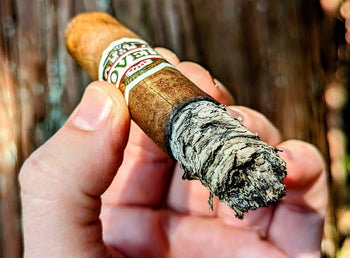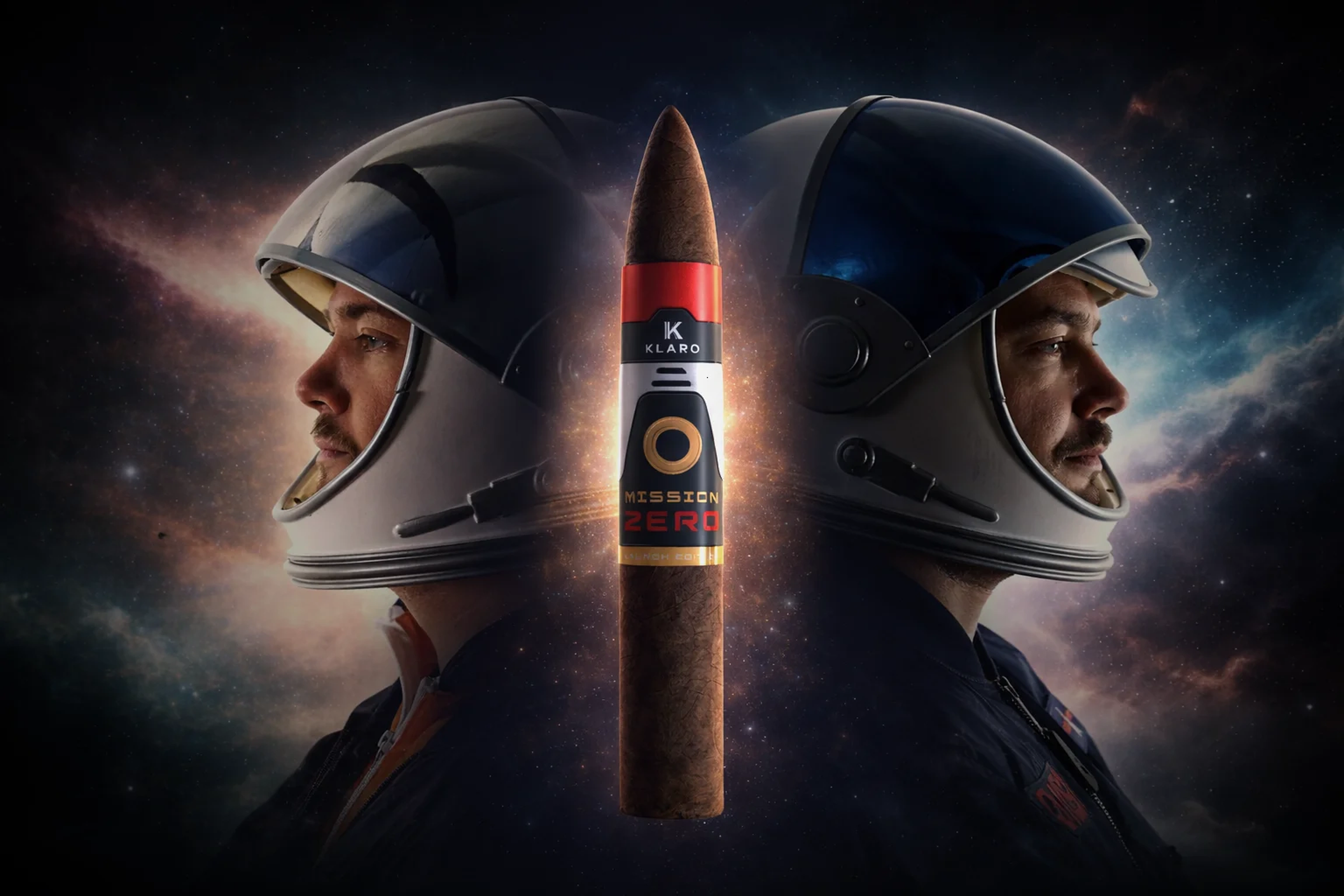We’re bombarded with cigar choices. Just visit a local cigar shop and you’ll be exposed to hundreds of types, sizes, and brands. Then go online and you’re exposed to even more. Separating the wheat from the chaff is an ongoing quest–you’re bound to get a dud here and there–but a general understanding of brands can help you gain some footing to find what you like, what you can count on, and what you should avoid.
What does your process look like when it’s time to pick out a few cigars for your collection or for a night at the cigar lounge? Do you stick to a few trusted brands and choices? Or do you branch out and try something new haphazardly? Maybe you leave it up to a quick conversation and recommendation with the shopkeep who may or may not know your preferences.
A lot of cigar smokers live in this world, but you don’t have to.
We’ve already provided some insight into the different types of cigars available in our guide to cigar types. Now, let’s explore the other side of things: the cigar brands every smoker should know.
UNDERSTANDING BRANDS
Before we dive into the list of cigar brands you should know, a bit about cigar brands: like many other international industries, there are a lot of players in the cigar game, a lot of respected brands. Thankfully, there isn’t a monopoly that dominates the market, and instead you have multiple mainstay cigar manufacturers who have led the industry for decades, as well as multiple up-and-comers who also make and distribute great smokes.
LEGACY VS BOUTIQUE
Without making too many comparisons to whiskey or coffee, major and minor baseball leagues, or cheese sections at the grocery store, let’s understand our use of the boutique and legacy terms this way: legacy brands are the widely-known, powerhouse names in the cigar industry that have a long successful history and track record making quality cigars. Boutique brands represent the smaller, often newer cigar companies that still offer great products but are less well-known as their legacy counterparts.
A lot of this comes down to an unfortunate pillar of the cigar industry as a whole: distribution and accessibility. Legacy brands, as we define them, are widely available. You are all but guaranteed to find legacy brands at any cigar shop you visit that’s worth its salt. Legacy brands are more likely to be consistent in quality, too. The availability of boutique brands will vary depending on the size of the tobacco stocker, the distribution reach of the brand, and the popularity of the cigars.
COUNTRY OF ORIGIN
Where a cigar comes from and the tobacco used is a defining quality that even non-smokers are familiar with. Any yahoo off the street has a basic understanding that Cuban cigars are somehow rare and somehow coveted, for example. And anyone who spends twenty minutes perusing the selections at a cigar shop will quickly come to the conclusion the cigar industry is dominated by Central America. This comes down to where and how tobacco grows best, how it's curated for different types of cigars, and the manufacturing process. Today, nearly 44% of cigars are manufactured in
Cigars aren’t political, but their history is tied to geopolitics in a big way. The 1962 U.S. trade embargo on Cuba affected the cigar industry in lasting ways still felt today. Now, some companies such as Montecristo have parallel brands of the same name but different countries of origin. Non-cuban Montecristos are legally sold in the U.S. while their Cuban counterparts are illegal to be brought to the U.S. or sold. Following the embargo, many cigar makers left Cuba and began operations in neighboring countries such as the Dominican Republic, Honduras, and Nicaragua.
As you navigate the histories of different cigar brands, note their relationship to the tobacco trade in general. The histories are often as fascinating as the cigars. This will help provide a narrative as you become familiar with more brands–and you can also witness how different brands collaborate, compete, and connect.
BRAND NOTES
Cigar making is typically a family affair, with techniques, investments, farms, and blends passed down from generation to generation. As you explore different cigar brands and complete your own research, note the changes that occur over time as businesses reinvent themselves. You’ll see some famous cigar families working together–the Fuentes and the Ashton brand, for example.
You’ll often hear cigars described as “premium,” which in many other cases would be a throwaway term but, in our context, has some meaning. Look for where brands are described on the spectrum of “premium”: high, middle, or low end. This represents the quality, process, and price of the cigar. For example, you could expect a high-end premium cigar to be from a reputable company, likely aged longer, and more expensive than a low-end premium cigar. This classification can help you the next time you’re at the shop looking for a middle-range premium cigar for the weekend.

LEGACY BRANDS
Below are a handful of legacy brands you will likely recognise if you have any experience in the world of cigars. By no means is this a comprehensive list, and we will add to this list of legacy brands as they are introduced in our monthly cigar subscription choices. For now, any time you’re in doubt, these brands represent some of the most reliable, quality cigars available.
These companies have a long history in the industry and the reason why they’ve achieved legacy status has to do with their ability to produce consistently great quality cigars even in the midst of political changes, environmental changes, access to materials, distribution, and any other host of problems that could cause chaos for a cigar maker.
A note on legacy brands: most of the major brands also have branched off into sub-brands and categories that can be difficult to keep track of. As you discover more about brands, follow the organizational tree to see what involvement they might have with a major name. 
Arturo Fuente
If you’ve had any involvement in cigars, there’s a good chance you’ve heard the name or smoked a cigar from the Arturo Fuente brand. Founded in 1912, the company started in West Tampa, Florida, but a series of fires caused an extensive gap in the company’s history and it was eventually relocated in the Dominican Republic where it now produces 30 million cigars a year. They have a huge footprint on the industry, manufacturing several brands as well as their flagship and have a solid reputation of crafting quality cigars with their motto, “We will never rush the hands of time.”
Some favorite selections include:
- Fuente Fuente Opus X
- Don Carlos #2
- Sun Grown Royal Salute
- Especiales Cazadores
Ashton
The world of cigars often intermingles, and that’s the case with Ashton and Arturo Fuente. Robert Levin started the Ashton brand in the 1980s, and from the beginning he worked with the Fuente family to develop and manufacture his cigar brand. Fuente manufactures Ashton cigars to this day and remains a business partner, sourcing all their cigars from the factories in the Dominican Republic.
Now a three-generation, family-owned enterprise, Ashton is considered one of the “Top 5” cigar companies and sees widespread distribution. They are owned by Holt’s Cigar Company and offer 30 different sizes and shapes between the prices of $4.50 and $17 a piece, putting them on the high-end of premium cigars. In the early 2000s, Ashton launched two sub-brands that remain popular today, La Aroma de Cuba and San Cristobal.
Ashton cigars are graded highly on cigar ranking scales and some of their favorite selections include:
- Ashton Classic
- Ashton Aged Maduro
- Ashton Cabinet
- Ashton VSG
- Ashton ESG
Cohiba
Cohiba cigars are a relatively new addition to the legacy brands and were created in 1966. Known to have been Fidel Castro’s cigar of choice, this brand is as about as connected to the Cuban revolution as you can get. Famously, Castro was introduced to the cigar by his bodyguard on a whim, but he soon adopted a Cohiba 7 ½ 38-gauge Lancero as his mainstay and presented the cigar to diplomats as gifts.
Cohiba remains a premium Cuban company, and therefore their products are illegal in the United States. However, General Cigar operates a Dominican version that is still widely available in the United States, though still at a steep price. These are one of the more expensive cigars available, and a five-pack of Cohiba Dominican Red Dot Robusto will run you nearly $100, while the Cohiba Spectre Toro will run $100 a cigar.
Cuban Cohiba lines include:
- Linea Clasica
- Linea 1492 (Siglo Series)
- Maduro 5
- Behikes
General Cigar Cohiba lines include:
- Blue
- Red Dot
- Black
- Macassar
- Nicaragua
- Connecticut
- Royale
- Spectre
Davidoff
Following suit with a once-Cuban-now-Dominican line of cigars, Davidoff is owned by Oettinger Davidoff AG, a Swiss company who also owns Camacho and Zino Platinum. The Davidoff brand has a storied connection with the Cuban tobacco industry, most notably the Cohiba brand, with Zino Davidoff having at one point manufactured cigars in Cuba in the same factory as where Cohibas are made. Zino Davidoff They are now exclusively made in the Dominican Republic and Honduras with tobacco sourced from a number of Central American countries.
You won’t have any trouble finding Davidoff’s at most tobacco and cigar shops, and though they source tobacco from a number of different regions, you can count on the consistency. Davidoffs are a high-end premium cigar and come with a price consistent with that quality. You’ll pay upwards of $36 a cigar for a Davidoff Aniversario, for example. They also sell an Oro Blanco–their most expensive cigar–at $500 a pop, but that’s hardly considered one of their standards.
Notable lines include:
- Grand Cru
- Signature
- Aniversario
- Millennium
- Nicaragua
- Yamasa
- Escurio
Perdomo
The Perdomo brand has a storied history in the cigar industry. Crossing three generations, the brand got its start with Silivo Perdomo, the brand's patriarch, who began making cigars in the early 1930s in Cuba. Now, the company is based in Miami Lakes, Florida with manufacturing operations in Nicaragua and is run by Silvio’s grandson, Nicholas Perdomo Jr. They are one of the few cigar companies that is completely vertically integrated, meaning they handle everything from seed to cigar, which allows them to control every process and detail of their cigars.
Perdomo is known for using bourbon barrels to age their cigars to the desired color, texture, and cigar flavor profile, and their team is led by legendary tobacco expert Aristides Garcia who brings years of industry experience to their craft process. Their cigars win awards such as the “Best Cigar Nicaragua 2014” by Cigar Journal and consistently receive high cigar ratings from reviewers.
They keep their lines simple with three standard, consistent wrappers:
- Connecticut
- Sun Grown
- Maduro
If you’re new to Perdomo, check out their Fresco Churchill Connecticut, an affordable, medium-bodied cigar that represents their quality. Perdomo also features a small batch lineup.
Padron
Owned by Piloto Cigars Inc., the Padron brand is a popular Nicaraguan cigar maker whose name is widely known and respected in the world of cigars. Their company, too, has been affected by political strife including the Cuban revolution, a civil war in Nicaragua, and trade restrictions to the U.S., but it now maintains operations in Nicaragua and has wide distribution. They just happen to be neighbors of Perdomo in Esteli, too.
The business is vertically integrated and the soil where they grow tobacco in Esteli is comparable to the original soil in the Cuban province of Pinar del Rio, where founder Jose Orlando Padron first made cigars. While Padron offers a total of six series of cigars, they are most well-known and popular for three Padron series, which include Padron, 1964 Anniversary, and 1926 Serie. Their other three series include:
- Damaso
- Family Reserve
- 50th Anniversary
Romeo y Julieta Cigarros
By 1910, the Romeo y Julieta brand was producing more than 20 million cigars each year, which were mostly sent to the U.S. or U.K. Since that time, the company has been moved through different locations and owners, from Cuba, to the U.S., to the Dominican Republic, and it now is owned by two subsidiaries of Imperial Brands: Habanos S.A. in Cuba, and the massive conglomerate Altadis in the Dominican Republic.Perhaps Romeo Y Julieta’s largest claim to fame is that Winston Churchill famously preferred their cigars.
The Romeo Y Julieta 1875 is their most popular cigar–a mainstay 130 years old–and is a great introduction for first-time cigar smokers, offering a medium and mild flavors. Their other lines include:
- Reserva Real
- Reserva Real Nicaragua
- 1875 Nicaragua
- Reserve
- Vintage
- 1875 by Romeo Y Julieta

BOUTIQUE BRANDS
The boutique brands are the newer underdogs of the cigar world. More restrained in distribution and often making smaller batches, boutique brands offer welcomed change-ups to the lineups you’re used to. Boutique brands may be harder to come by on a regular basis, but that’s not at all a reflection of poorer quality than the legacy brands you know and love.
There are more boutique brands than legacy brands–the field gets narrower at the top–and below we’ve only highlighted a few of the many boutique brands available in the U.S. As the Klaro Cigars monthly subscription includes boutique cigars in their selections, we’ll feature them on the blog so you can learn more about the cigar, the company, and what you’re receiving.
Illusione
This younger boutique brand out of Reno, Nevada has been bringing in the awards since 2006 with no sign of stopping anytime soon. As you peruse their online catalog, note the consistently high rankings their cigars receive from notable reviewers. While you're at it, did you notice the sixteen lines in their brand? Quite a punch for a smaller, newer boutique brand. Which goes to show that many “boutique” brands can still carry a robust lineup of quality cigars.
Dion Giolito is the mastermind behind Illusione, and he boasts fifteen years working in cigar shops prior to starting this company. All Illusione premium cigars boast bold flavors and run from medium to full-bodied. Consider trying out their popular Illusione 88 or MJ 12 cigars.
Tatuaje
Boasting eighteen lines of cigars, Tatuaje is a Los Angeles boutique cigar brand that strives for a medium Cuban-inspired flavor profile. Aptly so, “Old world for a new generation” is their brand motto. Developed with the help of expert Don Pepin, their cigars are rolled in the US and Nicaragua with Nicaraguan tobacco, though many of their cigar wrappers are Ecuadorian. The company is owned and operated by Pete Johnson.
Some of their more notable lines include:
- Selección de Cazador (brown label)
- 10th Anniversary
- Black (black label)
- Tattoo

C.L.E. Cigar Company
C.L.E. Cigar Company is the second successful endeavor of cigar maker Christian Luis Eiora, who formed and popularized–and later sold–Camacho Cigars. In 2011, he branched away from his role with Camacho and formed C.L.E. Cigar Company, which is now four brands strong, with the CLE being the most popular. Christian’s father Julio brings extensive experience to the brands as well. All versions of the CLE Prieto rank highly, as do the CLE Corojo versions, and you can get a look at their complete lineup here.
C.L.E. Cigar Company also distributes Asylum cigars, a brand dedicated to redefining the large-gauge cigar in many ways.
Kristoff
Boutique brands can play the long game, too, and Kristoff has been around since 2005, though owner Glen Case had been in the industry before then. Working with Rolando Villamil, they produce cigars in the Dominican Republic with a unique bunching method called “entubar” which, they claim, allows for more air to travel in the leaves, producing more aroma and flavor.
They offer a wide range of cigars with tobacco that’s been double and triple fermented, and they are best known for their style of pigtailed style and uncut feet. The Corojo Limitada is the one to try should you happen across it at the cigar shop, and it runs at about $10 a pop. Other notable blends include:
- Premium Selection
- 685 Woodlawn
- Shade Grown
- Sumatra
Sobremesa
Roughly translated to mean “over the table” in English, the word sobremesa refers to the time spent at the table after a meal–enjoying an aperitif, friendly conversation, and, in this case, a cigar. In 2013, Steve Saka of Drew Estate cigars parted ways with the company and, two years later, created his Sobremesa and Sombremesa Brulee cigars. Owned by Dunbarton Tobacco & Trust, the Sobremesa is made in Joya de Nicaragua factory in Nicaragua with an Ecuadorian wrapper, a Mexican binder, and a blend of Nicaraguan tobacco fillers.
Along with the Sobremesa, the Dunbarton Tobacco & Trust includes the following brands:
- Mi Querida
- Mi Querida Triqui Traca
- Muestra de Saka
- Sin Compromiso
- StillWell Star
- Todos Las Dias
- Umbagog

There are well over five-hundred notable cigar makers across the world. Given that each cigar maker offers multiple selections, you have your work cut out for you to make a dent in your cigars-of-the-world checklist.
There will always be new options to explore–new blends, techniques, combinations, and hybrid designs to keep trying. In the same way coffee, beer, whiskey, or wine aficionados develop their pallet and grow new appreciations for different types, you too can have this experience with cigars. If you want to begin the process, consider a monthly subscription to Klaro Cigars. We’ll be updating this blog list with some of the choices you’ll receive each month so you can follow along with notable history about the brands, flavors to pay attention to, and conversations that surround the cigars you get each month.

 Mission Zero
Mission Zero


